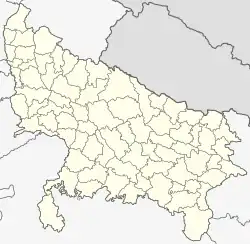| Chief Minister of Uttar Pradesh | |
|---|---|
 | |
| Government of Uttar Pradesh | |
| Style | The Honourable (Formal) Mr. Chief Minister (Informal) |
| Status | Head of Government |
| Abbreviation | CM |
| Member of | |
| Reports to | Governor of Uttar Pradesh |
| Residence | 5, Kalidas Marg, Lucknow |
| Seat | Lok Bhavan, Lucknow |
| Appointer | Governor of Uttar Pradesh |
| Term length | At the confidence of the assembly Chief minister's term is for five years and is subject to no term limits.[1] |
| Precursor | Premier of United Provinces |
| Inaugural holder | Govind Ballabh Pant |
| Formation | 26 January 1950 |
| Deputy | Deputy Chief Minister |
| Salary |
|
| Website | Office of the Chief Minister |
The chief minister of Uttar Pradesh is the principal minister in chief of the Government of Uttar Pradesh. As per the Constitution of India, the governor is the state's de jure head, but de facto executive authority rests with the chief minister. Following elections to the Uttar Pradesh Legislative Assembly, the governor usually invites the party (or coalition) with a majority of seats to form the government. The governor appoints the chief minister, whose council of ministers are collectively responsible to the assembly. Given that he has the confidence of the assembly, the chief minister's term is for five years and is subject to no term limits.[1]
On 26 January 1950 Govind Ballabh Pant, premier of United Provinces, became the first chief minister of the newly renamed Uttar Pradesh. Including him, 11 out of UP's 21 chief ministers belonged to the Indian National Congress. Among these is V. P. Singh, a future prime minister of India, as was Charan Singh of the Bharatiya Lok Dal. On ten occasions, most recently in 2002, the state has come under President's rule, leaving the office of chief minister vacant. UP has also had two women chief ministers—Sucheta Kripalani and Mayawati. Akhilesh Yadav of the Samajwadi Party served as the chief minister of Uttar Pradesh from 2012 to 2017; having taken the oath at 38 years of age, he is the youngest person to have held the office. Only three chief ministers completed their official tenure of five years: Mayawati, Akhilesh Yadav, and Yogi Adityanath.
Yogi Adityanath of the Bharatiya Janata Party is serving as the incumbent chief minister since 19 March 2017.He is the longest serving Chief Minister of Uttar Pradesh, who is currently running his tenure for over 6 years, surpassing Sampurnanand
Oath as the state chief minister
The chief minister serves 5 years in the office. The following is the Oath of the Chief Minister of Uttar Pradesh:
I, <Name of Chief Minister>, do swear in the name of God/solemnly affirm that I will bear true faith and allegiance to the Constitution of India as by law established, that I will uphold the sovereignty and integrity of India, that I will faithfully and conscientiously discharge my duties as a Minister for the State of Uttar Pradesh and that I will do right to all manner of people in accordance with the Constitution and the law without fear or favour, affection or ill-will.
Premier of United Provinces (1937–50)
The United Provinces, headquartered in Allahabad was a province of British India that comprised present day Uttar Pradesh and Uttarakhand. Under the Government of India Act 1935, a bicameral legislature was set up with a legislative assembly and a legislative council.
| Premier of United Provinces (1937–50) | |||||||||
|---|---|---|---|---|---|---|---|---|---|
| No | Portrait | Name | Term of office[2] | Party | Assembly | Appointee
(Governor) | |||
| Took office | Left office | Tenure | |||||||
| 1 | 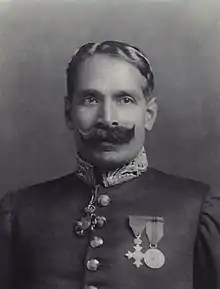 |
The Nawab of Chhatri | 3 April 1937 | 16 July 1937 | 104 days | Independent | 1st Assembly | Sir Harry Graham Haig | |
| 2 |  |
Govind Ballabh Pant | 17 July 1937 | 2 November
1939 |
2 years, 108 days | Indian National Congress | |||
| - | Vacant
(Governor's Rule) |
3 November 1939 | 31 March 1946 | 6 years, 148 days | N/A | Dissolved | - | ||
| (2) |  |
Govind Ballabh Pant | 1 April 1946 | 25 January
1950 |
3 years, 299 days | Indian National Congress | 2nd Assembly | Sir Francis Verner Wylie | |
Chief Ministers of Uttar Pradesh
| No | Portrait | Name | Constituency | Term of office[2][3] | Assembly[4] (Election) |
Party[lower-alpha 1] | |||
|---|---|---|---|---|---|---|---|---|---|
| 1 |  |
Govind Ballabh Pant | Bareilly | 26 January 1950 | 20 May 1952 | 4 years, 336 days | Provincial Assembly | Indian National Congress | |
| 20 May 1952 | 28 December 1954 | 1st (1951 election) | |||||||
| 2 | 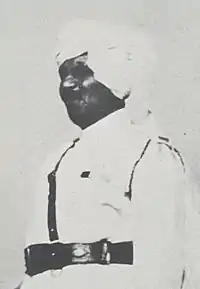 |
Sampurnanand | Varanasi South | 28 December 1954 | 9 April 1957 | 5 years, 345 days | |||
| 10 April 1957 | 7 December 1960 | 2nd (1957 election) | |||||||
| 3 | Chandra Bhanu Gupta | Ranikhet South | 7 December 1960 | 14 March 1962 | 2 years, 299 days | ||||
| 14 March 1962 | 2 October 1963 | 3rd (1962 election) | |||||||
| 4 | 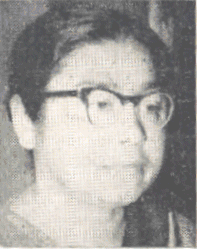 |
Sucheta Kripalani | Menhdawal | 2 October 1963 | 14 March 1967 | 3 years, 163 days | |||
| (3) | Chandra Bhanu Gupta | Ranikhet | 14 March 1967 | 3 April 1967 | 20 days | 4th (1967 election) | |||
| 5 |  |
Charan Singh | Chhaprauli | 3 April 1967 | 25 February 1968 | 328 days | Bharatiya Kranti Dal | ||
| – |  |
Vacant[lower-alpha 2] (President's rule) |
N/A | 25 February 1968 | 26 February 1969 | 1 year, 1 day | Dissolved | N/A | |
| (3) | Chandra Bhanu Gupta | Ranikhet | 26 February 1969 | 18 February 1970 | 357 days | 5th (1969 election) |
Indian National Congress | ||
| (5) |  |
Charan Singh | Chhaprauli | 18 February 1970 | 1 October 1970 | 225 days | Bharatiya Kranti Dal | ||
| – |  |
Vacant[lower-alpha 2] (President's rule) |
N/A | 1 October 1970 | 18 October 1970 | 17 days | N/A | ||
| 6 | Tribhuvan Narain Singh | 18 October 1970 | 4 April 1971 | 168 days | Indian National Congress (O) | ||||
| 7 | Kamalapati Tripathi | Chandauli | 4 April 1971 | 13 June 1973 | 2 years, 70 days | Indian National Congress | |||
| – |  |
Vacant[lower-alpha 2] (President's rule) |
N/A | 13 June 1973 | 8 November 1973 | 148 days | N/A | ||
| 8 | .jpg.webp) |
Hemwati Nandan Bahuguna | Bara | 8 November 1973 | 4 March 1974 | 2 years, 22 days | Indian National Congress | ||
| 5 March 1974 | 30 November 1975 | 6th (1974 election) | |||||||
| – |  |
Vacant[lower-alpha 2] (President's rule) |
N/A | 30 November 1975 | 21 January 1976 | 52 days | N/A | ||
| 9 |  |
Narayan Dutt Tiwari | Kashipur | 21 January 1976 | 30 April 1977 | 1 year, 99 days | Indian National Congress | ||
| – |  |
Vacant[lower-alpha 2] (President's rule) |
N/A | 30 April 1977 | 23 June 1977 | 54 days | Dissolved | N/A | |
| 10 | .jpg.webp) |
Ram Naresh Yadav | Nidhauli Kalan | 23 June 1977 | 28 February 1979 | 1 year, 250 days | 7th (1977 election) |
Janata Party | |
| 11 | .jpg.webp) |
Banarasi Das | Hapur | 28 February 1979 | 17 February 1980 | 354 days | |||
| – |  |
Vacant[lower-alpha 2] (President's rule) |
N/A | 17 February 1980 | 9 June 1980 | 113 days | Dissolved | N/A | |
| 12 | .jpg.webp) |
Vishwanath Pratap Singh | Tindwari | 9 June 1980 | 19 July 1982 | 2 years, 40 days | 8th (1980 election) |
Indian National Congress | |
| 13 | Sripati Mishra | Isauli | 19 July 1982 | 3 August 1984 | 2 years, 15 days | ||||
| (9) |  |
Narayan Dutt Tiwari | Kashipur | 3 August 1984 | 10 March 1985 | 1 year, 52 days | |||
| 11 March 1985 | 24 September 1985 | 9th (1985 election) | |||||||
| 14 | Vir Bahadur Singh | Paniyara | 24 September 1985 | 25 June 1988 | 2 years, 275 days | ||||
| (9) |  |
Narayan Dutt Tiwari | Kashipur | 25 June 1988 | 5 December 1989 | 1 year, 163 days | |||
| 15 | .jpg.webp) |
Mulayam Singh Yadav | Jaswantnagar | 5 December 1989 | 24 June 1991 | 1 year, 201 days | 10th (1989 election) |
Janata Dal | |
| 16 | 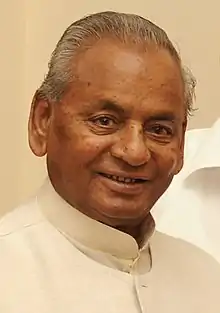 |
Kalyan Singh |
Atrauli | 24 June 1991 | 6 December 1992 | 1 year, 165 days | 11th (1991 election) |
Bharatiya Janata Party | |
| – |  |
Vacant[lower-alpha 2] (President's rule) |
N/A | 6 December 1992 | 4 December 1993 | 363 days | Dissolved | N/A | |
| (15) | .jpg.webp) |
Mulayam Singh Yadav | Jaswantnagar | 4 December 1993 | 3 June 1995 | 1 year, 181 days | 12th (1993 election) |
Samajwadi Party | |
| 17 |  |
Mayawati | N/A | 3 June 1995 | 18 October 1995 | 137 days | Bahujan Samaj Party | ||
| – |  |
Vacant[lower-alpha 2] (President's rule) |
18 October 1995 | 17 October 1996 | 1 year, 154 days | Dissolved | N/A | ||
| 17 October 1996 | 21 March 1997 | 13th (1996 election) | |||||||
| (17) |  |
Mayawati | Harora | 21 March 1997 | 21 September 1997 | 184 days | Bahujan Samaj Party | ||
| (16) |  |
Kalyan Singh | Atrauli | 21 September 1997 | 12 November 1999 | 2 years, 52 days | Bharatiya Janata Party | ||
| 18 | Ram Prakash Gupta | MLC | 12 November 1999 | 28 October 2000 | 351 days | ||||
| 19 |  |
Rajnath Singh | Haidergarh | 28 October 2000 | 8 March 2002 | 1 year, 131 days | |||
| – |  |
Vacant[lower-alpha 2] (President's rule) |
N/A | 8 March 2002 | 3 May 2002 | 56 days | Dissolved | N/A | |
| (17) |  |
Mayawati | Harora | 3 May 2002 | 29 August 2003 | 1 year, 118 days | 14th (2002 election) |
Bahujan Samaj Party | |
| (15) | .jpg.webp) |
Mulayam Singh Yadav | Gunnaur | 29 August 2003 | 13 May 2007 | 3 years, 257 days | Samajwadi Party | ||
| (17) |  |
Mayawati | MLC | 13 May 2007 | 15 March 2012 | 4 years, 307 days | 15th (2007 election) |
Bahujan Samaj Party | |
| 20 |  |
Akhilesh Yadav | MLC | 15 March 2012 | 19 March 2017 | 5 years, 4 days | 16th (2012 election) |
Samajwadi Party | |
| 21 | .jpg.webp) |
Yogi Adityanath | MLC | 19 March 2017 | 25 March 2022 | 6 years, 299 days | 17th (2017 election) |
Bharatiya Janata Party | |
| Gorakhpur Urban | 25 March 2022 | Incumbent | 18th (2022 election) | ||||||
Timeline
Representation of chief ministers by party
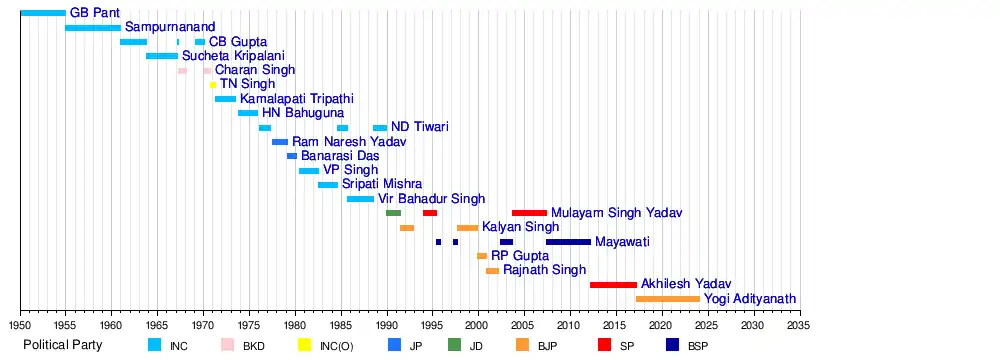
Notes
- ↑ This column only names the chief minister's party. The state government he heads may be a complex coalition of several parties and independents; these are not listed here.
- 1 2 3 4 5 6 7 8 9 When President's rule is in force in a state, its council of ministers stands dissolved. The office of chief minister thus lies vacant. At times, the legislative assembly also stands dissolved.[5]
References
- 1 2 Durga Das Basu. Introduction to the Constitution of India. 1960. 20th Edition, 2011 Reprint. pp. 241, 245. LexisNexis Butterworths Wadhwa Nagpur. ISBN 978-81-8038-559-9. Note: although the text talks about Indian state governments in general, it applies for the specific case of Uttar Pradesh as well.
- 1 2 Chief Ministers. Uttar Pradesh Legislative Assembly. Retrieved on 27 July 2013.
- ↑ President's rule. Uttar Pradesh Legislative Assembly. Retrieved on 27 July 2013.
- ↑ Date of Constitution & Dissolution of Uttar Pradesh Vidhan Sabha Archived 12 August 2013 at the Wayback Machine. Uttar Pradesh Legislative Assembly. Retrieved on 27 July 2013.
- ↑ Amberish K. Diwanji. "A dummy's guide to President's rule". Rediff.com. 15 March 2005. Retrieved on 3 March 2013.
External links
- "Chief Ministers of Uttar Pradesh". The Indian Express. 15 May 2007. Retrieved on 28 July 2013.
.jpg.webp)

